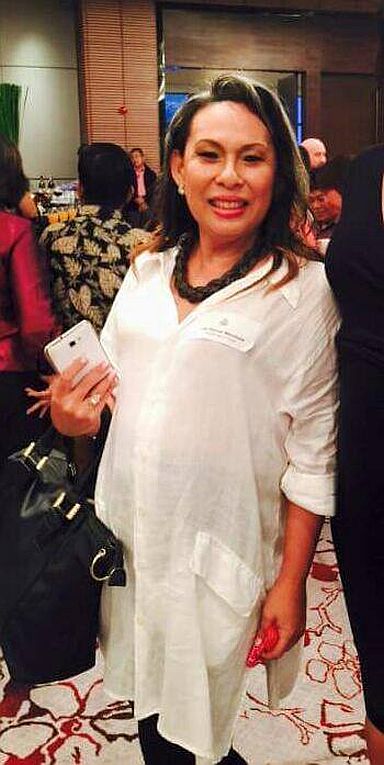
Jude ‘Madam Judai’ Mendoza keeps her poise amid work pressure.
Jude ‘Madam Judai’ says gender preference shouldn’t be an obstacle to achieving one’s dreams in life
Colored contact lens, long eye-lashes, full make-up, with pearls and killer high-heeled boots aren’t usually the regulation uniform for the police’s Scene of the Crime (SOCO) personnel.
But Jude Daniel Mendoza, aka Madam Judai, wears these along with her SOCO uniform whenever she goes on field work.
She is part of the PNP-NUP (Non-Uniformed Personnel) in charge for drug testing in Central Visayas.
Madam Judai, a transwoman, is one of the senior forensic specialists in the Police Regional Office (PRO-7) having worked in the field for 27 years.
Right now, she handles all random drug testing in PRO-7.
Even when she’s traveling from one province to another, Judai makes an effort to be all made up from head to toe while doing her work.
“It’s the total package. That’s me, and I do my job diligently,” she said while laughing.
Ever since she was a kid, she already knew that she is different from other kids of her age and her gender.
“I’m the eldest child. My brother was four years younger, and he played with the toys meant for boys. I entertained myself by playing with paper dolls and the dolls of my cousins,” Judai said.
Her father didn’t accept what she had become. She said she came out as gay and then a transwoman a few years before her father died.
“Years before he died, he saw me with my long hair; and eventually, he accepted it,” she said.
As far as she can recall, Judai said she wasn’t bullied as a kid.
Her gender preference didn’t stop her from working on her career.
Judai said she was in the process of being a transwoman when she entered the police force.
In 1989, Judai was appointed as one of the forensic serologist in PNP, but she was adamant about the job offer as she graduated with a medical technology course at Velez College.
“My orientation was in diagnostics, but I was appointed for a medtech post in the PNP crime lab. At the start, my work in forensics is a different nature from diagnostics, which is my orientation in college,” she said.
She said she didn’t like her work at first, but she persisted and eventually adjusted to her job.
Judai’s career breakthrough came when she handled the forensics for the controversial rape-murder of the Chiong sisters.
“Public acceptance of me as a transgender person working on forensics and then testifying in court is gratifying. I was happy, it was empowering for me, and it proved that the LGBT (lesbian, gay, bisexual and transgender) community can excel in everything like forensics,” she said.
Judai said there were times when she wasn’t taken seriously by police officers and the public due to her being a transwoman.
She said a lawyer objected to her presentation because she was a transsexual.
“I wasn’t fit to testify because I was gay, he said. I countered that I am not a character witness but a witness with technical and scientific expertise. It does not matter whether I’m transgender or not because it’s related to my job as a forensic expert,” she said.
Judai said she wants the public to know that it’s not about gender but a person’s willingness to serve and do their jobs to the best of their God-given abilities.
“Gender preference is not a problem so long as you didn’t hurt anyone, and you do your job right,” Judai said.
Turning 51 this year, Judai said she achieved her career goal in life and hopes to inspire others including the LGBT community. Judai said people should not be afraid of what or who they are.
“My goal now is to become a millionaire, so I can build my dream house,” she said laughing.=

